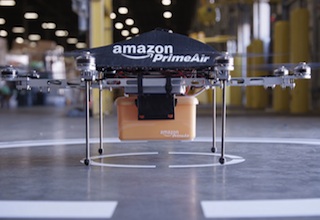Recently, Amazon CEO Jeff Bezos revealed his company’s plans for using autonomous flying drones to deliver packages to customers within a limited range. On a segment aired on 60 Minutes, Bezos explained the concept, dubbed Amazon Prime Air, to journalist Charlie Rose.
The idea doesn’t seem that far-fetched. Drone technology has existed for quite a few years and is fairly well established and understood. And while there may be some technical issues to iron out, including battery life and network programming to enable truly autonomous operation in densely packed urban settings, the real issues may be the legal and ethical ones involving privacy, public safety and legal liability.

For instance, one obstacle to this vision is that current FAA regulations prohibit autonomous flying vehicles, meaning that a drone has to have a human in control, called a PIC or pilot-in-command. Amazon’s plans clearly run up against these regulations. But they are hopeful that the FAA’s revised guidelines will accommodate autonomous drone flight with an optimistic date of 2015 in mind.
Legal liability is another issue. Beyond the possible accident scenarios of drones crashing into buildings or people on the ground, there may very well be concerns over noise and nuisance. If people can call in complaints of neighbors with loud stereos and backyard auto mechanics with loud cars, it’s not that much of a stretch to imagine people complaining about flying, buzzing delivery drones ruining their quiet backyard gardening or meditation time or family barbecue.
Along with the legal issues are broader ethical concerns; specifically, people’s sense of their privacy being invaded by these flying drones. Along these same lines may be a broader aesthetic issue of whether or not we really want to live in a world where low-flying autonomous drones fill the skies.
At the end of the day, it’s clear that as robots move into other areas of our lives besides the industrial space where they’ve been for years, our laws as well as our everyday world of expectations and norms and mores will have to change to some degree in order to make room for our new companions. And not to sound alarmist, but we should think before we leap. There are still some hurdles to overcome but if done properly, it may not be as scary of a new world as we imagine it could be.


Leave a Reply
You must be logged in to post a comment.